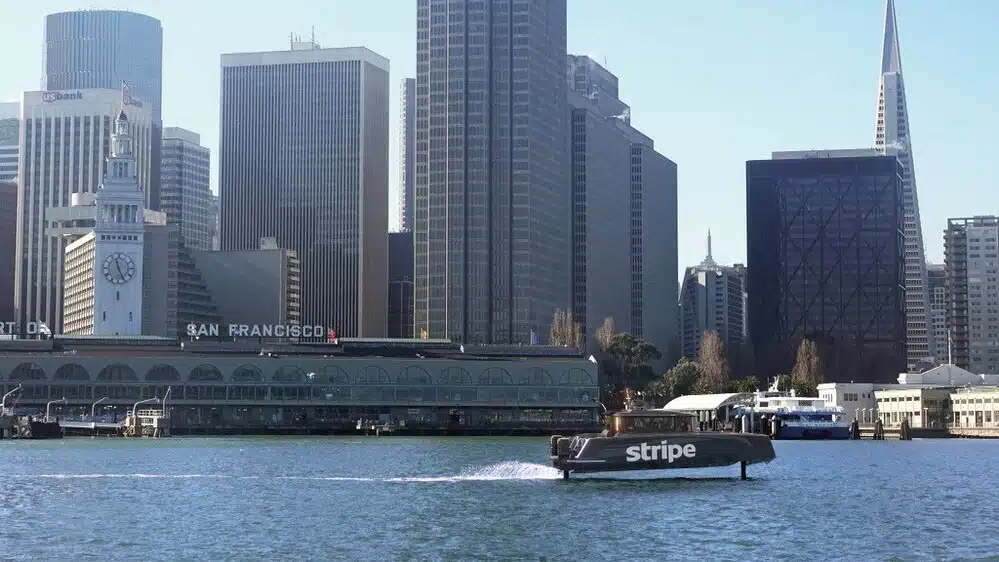Navier, the pioneering startup that is ushering in a new era of water transportation by creating and operating ultra-efficient, zero-emission maritime vessels, today announced a first-of-its-kind pilot program to provide water transit services to Bay Area commuters. Stripe, the financial infrastructure platform for businesses, will be Navier’s initial partner in this program, with Navier providing water shuttle services for Stripe employees from Larkspur, California to Stripe’s US headquarters in South San Francisco.
Sampriti Bhattacharyya, Co-Founder and CEO of Navier, said, “Navier’s mission is to introduce the next generation of high-speed, zero-emissions water transportation, starting right here in the Bay Area. This pilot program will connect parts of the Bay Area where traditional ferries are not available, cutting commutes that take an hour or more to less than 30 minutes door-to-door – all with no carbon emissions.”
Bhattacharyya continued, “The pilot program with Stripe will provide a valuable case study as we explore ways to efficiently reduce employee commute times and emissions in coastal cities. Today, 46% of the world’s population lives in crowded coastal areas, which continue to struggle with traffic congestion, fossil fuel pollution and a lack of affordable housing options. Our pilot program demonstrates a clear path forward for these cities to reduce traffic, costs and emissions; connect business hubs with more affordable areas; and unlock the productive potential of millions of workers who would otherwise spend uncounted hours stuck in traffic.”
Transportation services under the Stripe pilot program will be operated by Navier Mobility, the company’s water transit arm. Navier will provide one of its flagship N30 6-passenger boats at launch in March 2024, followed by another five to seven boats thereafter. The company plans to add passenger boats with significantly expanded capacity to the service in the near future.
Navier Background & Business Model
Navier’s goal is to change the future of water travel by creating the next generation of clean, high-speed water transit. Its flagship vessel, the N30, is America’s first all-electric hydrofoil boat, with a revolutionary design that reduces operational costs to only $0.38 per mile, a 10x reduction compared to traditional boats. The N30 also boasts the longest range of any electric boat in the world, clocking in at 100 miles at cruising speed.
The N30 addresses the two key challenges that make smaller boats (i.e., those in the 24 – 45 ft range) unfit for scalable transportation: namely, cost and comfort. Gliding four feet above the water, the N30 eliminates hydrodynamic resistance and provides a smooth, quiet ride with no sea sickness. It also eliminates the extensive infrastructure needed to operate large ferries – as it can operate from any marina – creating opportunities for more frequent, more efficient trips with higher capacity utilization.
Navier’s early investors include Google co-founder Sergey Brin, Android co-founder Rich Miner, Sustainable Ocean Alliance (backed by Salesforce co-founder, chairman and CEO Marc Benioff), Propeller VC (backed by Hubspot co-founder and chairman Brian Halligan), Global Founders Capital, Treble, Next View Ventures, Liquid2 Ventures, Soma Capital, Precursor Ventures and Will.i.am.
Navier’s elite engineering team includes MIT-trained aerospace and robotics engineers with experience at NASA, Google X, Amazon Robotics, Apple and Ferrari, among others, along with America’s Cup experts. The team has executed rapidly on its growth plan, both designing the N30 and ramping up to full production in less than two years – far surpassing the speed of most hardware companies’ development cycles.
The N30 currently seats six passengers. Navier is also developing expanded models that will seat up to 30 passengers for higher-traffic routes. Navier estimates that each 30-passenger hydrofoil model will reduce automobile usage by the equivalent of 120 cars, with a commensurate reduction in traffic and carbon emissions in coastal cities.
In addition to reducing pollution and congestion, high-speed zero-emission water transit can provide significant quality-of-life benefits for workers in coastal cities like San Francisco, New York, Seattle and others. As one example, Navier hopes to eventually connect Oyster Point, California in South San Francisco to the family-friendly suburb of Alameda, allowing workers to more easily live in and commute from a location that has 30% lower housing prices.
Navier envisions a future where every marina becomes a transportation hub, driving increased opportunity, real estate development and economic activity by transforming waterways into highways.
Navier’s Bay Area Growth Strategy
Oyster Point will be a major area of focus for Navier going forward, with over 200 companies and their approximately 20,000 employees based there. The company’s initial route under the pilot program will run from Oyster Point to Larkspur, with the goal of expanding to additional routes such as Alameda, Berkeley, Emeryville, Oakland and Sausalito going forward.
The company will work with existing operators in the Bay Area to operate the electric vessels as part of its service. The shuttles will be equipped with Wi-Fi and tables to enable en route productivity.
Bhattacharyya concluded, “Navier conducted a successful, month-long roadshow to engage city officials, transportation departments and other stakeholders in some of the country’s largest coastal cities last October and received overwhelming positive interest in bringing high-speed water transit to each metro. It is deeply gratifying to start on this path with a pilot program that contributes to the revitalization of our home base of San Francisco. We look forward to rapidly growing to serve other coastal cities such as New York, Boston, Seattle and Miami, among others. The clean, high-speed revolution in water transportation – and its benefits for commuters, companies and cities everywhere – is just beginning.”












